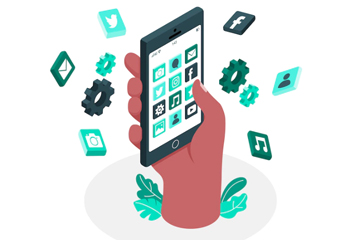
Even in 2022, iOS apps still outperform Android apps in terms of quality. In addition, there is an issue that has persisted for a very long period. Perhaps the most crucial element of every smartphone is its apps. Unquestionably, this is one of the areas on which Apple has put particular emphasis. While Google has made numerous attempts to improve its functionality, iOS has consistently outperformed Google.
Since the beginning of the competition, iOS vs Android has been one of the most frequently discussed subjects. Customers may disagree about Apple's closed environment, Android's superior alerts, and many other topics, but the discussion about app quality can be rather engaging. In addition, there are many components that go into making a smartphone. Its primary purpose is to use every programme effortlessly.
Furthermore, it's undesirable if one platform offers a superior app experience to the others. You'll notice a clear difference between the two platforms when comparing both iOS and Android apps. These variations are initially relatively minute. For example, the playlist description is below when using the Spotify iOS app. A shortcut to a newly formed account is also available to you.
The iOS app may also alter the background to match the album's theme, although Android users must slide on the playlist thumbnail to see this information. Unfortunately, Android does not do this. Other than that, there are a few minor issues that stand out when compared side by side.
When using iOS, users encounter significantly fewer hitches and slowdowns. One area where iOS excels considerably more than Android is performance. With iOS, your business app will run without any issues. Additionally, the version does have robust specifications. Cores and speed clocks are less critical than processing power. Apple's processors outperform Qualcomm's by a wide margin. They are also precisely optimised to work.
In a closed ecosystem, integration is more tightly woven. Apple manages the entire production process. It guarantees more effective utilisation of resources. When publishing the apps, developers need to adhere to a rigorous process.
One of the things iOS has gotten great at is updating software. The iOS device will soon be released if it is eligible for the most recent updates. However, if your system is updated frequently, this can be advantageous.
With Google's Android, the update procedure is not always flawless. This is because Google provides only direct updates for its products. Some people might not receive updates effectively, though.
iCloud, iMessage, FaceTime, and other proprietary services are linked with Apple products like iPhones, iPods, Apple TVs, Apple Watches, and Mac PCs. Additionally, the app store has superior moderation and oversight over the Google Play Store. The app development team goes through time-consuming and expensive checks and processes. It's incredible how much the quality of iOS apps has improved overall.
In terms of security, iOS outperforms Android; Apple devices are invariably superior. iOS updates are more reliable across all devices. A restricted ecosystem is more difficult to hack, and a tighter app store represents strong security characteristics.